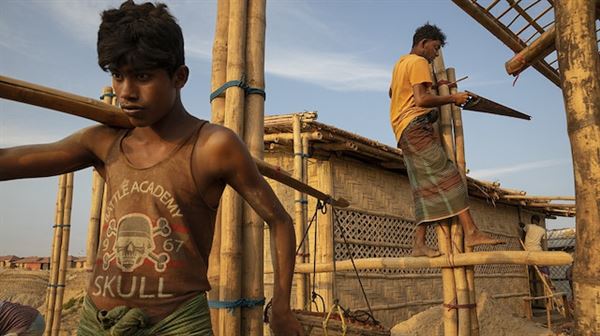After spending nearly two years in Hnget Awe San Youth Rehabilitation Centre in outskirts of Myanmar’s largest city Yangon, Abdul Morphorus some
After spending nearly two years in Hnget Awe San Youth Rehabilitation Centre in outskirts of Myanmar’s largest city Yangon, Abdul Morphorus sometimes feels that it is his home.
“But it is not real. My home is in Rakhine. My family is there,” said the 17-year-old Rohingya boy who is from West San Pya quarter in Sittwe, capital of Rakhine state.
He was given a two-year jail sentence in late 2017 after a police search where 34 tablets of methamphetamine were found in a motorbike taxi he took. He denied the tablets belonged to him, however admitted that he used drugs before the arrest.
He was sent to Hnget Awe San Youth Rehabilitation Centre as he was considered a minor offender under the Child Rights law.
His wife was pregnant when he was arrested, and gave birth to a boy about three months after he was sent to the center.
“I am dying to see him. I don’t even know what he looks like,” he told Anadolu Agency, adding the center occasionally allows him to make phone calls to his family.
He is very eager to leave the center, however said he has mixed feelings about the center because it is a place he learnt new skills to start a new life when he leaves.
“When I was taken here, I was very afraid because I heard Burmese people hate us,” he recalled.
“I don’t know about other places, but here we are treated as human,” he said.
During a visit to the center on Sunday, Anadolu Agency reporter was able to speak to about a dozen Rohingya boys freely.
Mahmud Babul is a Rohingya boy from Wakan village in Rakhine’s Kyauktaw township. He was sent to the center in January after being arrested and charged for traveling to Myanmar-Thailand border.
“Six men and I walked 18 days to Bago. We were arrested when we took a motorcar to Myawaddy,” Mahmud Babul told Anadolu Agency, referring to a border town in southeastern Myanmar.
He added that each had paid 4 million Kyats ($2,606) to traffickers to take them to Malaysia from their village.
He said three of his brothers, who already managed to go to Malaysia through illegal routes, inspired him to take the risk.
“I was not happy with the conditions back in my village. We have nothing to do. If I was in Malaysia, I would have better future,” he said.
There were about 86 Rohingya juveniles in the center in 2017 — 60 in 2018 and more than 90 in early months of 2019 — according to Aung Soe Kyaw, head of the center.
Out of all 564 trainees now in the center, 35 are Rohingya, he said.
“In July, some 60 Bengali youths were sent back to their home in Rakhine state,” he told Anadolu Agency.
He added that most of the Rohingya boys who were sent to the center were convicted of attempting to travel to Yangon and then to a foreign country with the help of human traffickers.
“But in our eyes, they are just adolescents. They need nurture,” he said.
Twice a day, in morning and in evening, youths have to worship in their dormitories.
Youth rehabilitation centers have a bad reputation and colloquially known as prisons for children. Authority however said reforms have been carried out in centers to help young offenders start a new life by providing vocational trainings.
Hnget Awe San, the oldest and biggest among youth rehabilitation centers run by the Social Welfare, Relief and Resettlement Ministry to house children aged under 18, who have been convicted of a crime, has no gate or sentry at the entrance but just a low fence.
“It is not a prison. Children are allowed twice a day to go out of the center campus,” said Aung Soe Kyaw, adding the center has only 47 staff.
He said moral support is more important than high fence and tight security to prevent the boys from running away.
“No one so far runs away this year,” he said.
He added that the center is also helping youths for family reunion with the help of International Committee of Red Cross.
The center provides four kinds of vocational training to young offenders.
Abdul Morphorus said he joined two vocational trainings since he arrived here one year and ten months ago.
“I am ready to run a motorcycle repair shop when I am back home,” he said.
However Muhamed Ali Joha, who identified himself as a Bangladesh citizen and from a village in Bangladesh side near the border, has no idea on where to go back.
The 15-year-old boy was arrested earlier this year when he joined a group of six adult men in crossing border and harvesting bamboo in Myanmar side.
“I don’t know if I will be able to go back home,” he said.
